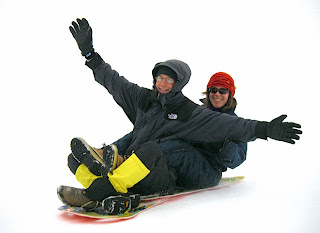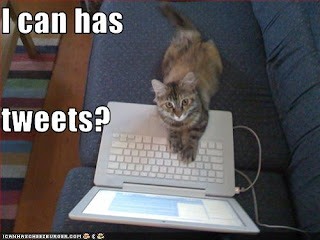 1. Sports Writing
1. Sports WritingI'm not really exaggerating when I say that I don't know anything about sports. I know basic rules for most games and follow them well enough, but the intricate stuff? Names of players (or even coaches)? Any player's stats? Throw any of that at me and I'm completely lost. Hilliard opened my eyes to the idea that sports writing and news writing aren't all that different. He basically says that the biggest difference between news writing and sports writing is style, making the process so much less intimidating than it had been before.
2. Social Media

Though not really discussed in the Hilliard book, I found one of my biggest revelations to be about the power of social media. Things like Twitter, Facebook, etc are great at keeping us connected, but even better at spreading the word. News writing is important and difficult, but the news spread and content created by users themselves is nothing to sneeze at. Last year, Twitter exploded with updates about fraud in the Iranian presidential election. Without Twitter, I feel like a lot of people would have been left in the dark about a really important issue and it was used as a rallying tool to get people together. It may not be media writing exactly, but never underestimate the power of the people.
3. Writing for your Audience
A lot of media writing seems to be based on intuition.
Hilliard spends a lot of the book talking about the audiences that the media writer has to cater to. I never really thought about the way a media writer had to keep so many different audiences in mind in the writing process. It's not just the viewers; the writer has to keep in mind the censors, the government agency in charge of it, the people paying for the ad. It's an entirely different set of rules for each ad too, and the audience is constantly changing.
4. The Power of the Commercial
Early in chapter four, Hilliard quotes Chuck Barclay as saying "Even the worst commercial, repeated often enough, sometimes produces results." I always sort of felt like "oh society is so much smarter than that", but I keep being proven wrong. Repetition really does sell. We remember the things that have been pounded into our brains over and over again, which is a great selling technique, I would say. Like these commercials:
They're pretty much the most heart-wrenching ads in the entire world. They hit you where it hurts, but they're so effective because they are played over and over and just stick with you. Whenever I watch television with my roommate and she goes "ugh, I hate this commercial," I know it's been at least a little effective because she can recognize it immediately.
 5. Corporate America's Hands in the Cookie Jar
5. Corporate America's Hands in the Cookie JarIt makes sense that corporations would have a lot of say in the media they pay to produce or have made for them, it just surprised me at the sheer amount of say that they have. They really have control over everything, even the writing process. When writing an ad or a piece for a company specifically, a writer has to go through a lot of steps in order to get it approved, give it the look or spin the company is looking for, etc. It's a tough crowd to please, and it is especially tough when you realize that they wield pretty much all of the power in today's media because they bankroll most of it.
 6. Talk Shows
6. Talk ShowsI was never a fan of the talk show (though back in the day I was a pretty big fan of Conan), but now I kind of understand them and how they're written. One of the first things I picked up on was the way Hilliard described the interview. In my audio production class, we had to interview people (personality interviews), and making it short while still keeping it interesting and on-point was extremely challenging. It took about 30 minutes of talking to produce 3 minutes of published interview; some of the ideas like writing some things out first would have been so, so helpful.
Another thing I found interesting was the technique of it all. There has to be so much research done, whether the interview is live or not. Interviewers have to be on top of their game too, in case a question they think will pan out with a great answer doesn’t go anywhere. There are also so many lines to draw up beforehand in terms of what is alright to talk about and what is not. Such a crazy balance. Before reading the chapter, I wondered if talk shows had lost their touch. Then, all of the Conan-Jay Leno drama occurred, and I realized they aren't going anywhere for quite a long time.
(Team Conan 4 Life)
 7. Reality
7. RealityThe last chapter of the book deals with what to expect in terms of a career in media writing. Hilliard sugarcoats nothing; he says that writing is probably the hardest thing to get involved with in the world of media. We’ve learned all the screenwriting methods, we’ve seen the best examples and learned the ins and outs of the business, but here Hilliard sort of gives the book a personal touch by giving his own opinions and suggestions. He makes it clear that writing is a tough business to get into, no matter what your circumstances are. There is no "Cinderella Story"; in the end, it's about experience and what you do and work on in order to get to the top of your writing game. It's a tough business, Hilliard says, but it is a business that is more than worth it.
8. The Rundown
My mom works with a girl who used to film a reality television show in California. It was basically local access, but I've heard a lot about it and it sounds pretty horrifying. It was really interesting to read Hilliard's example of rundowns and seeing that these things actually have an entire plan and an entire workup to them. His best example comes from the Macy's Thanksgiving Day Parade. So much work and planning goes into this event and it is amazing that the event has such a basis in media writing to begin with.
9. The Internet
The internet change EVERYTHING. All of these media techniques, styles, etc, they all change the second you put this new medium into play. Viral videos, blogs, twitter? All of these things came about because people needed to push the envelope, and it's just so interesting to see how media writing changes with the technology. Things that couldn't happen years ago, connections that couldn't be made, are all possible in this stage. I spend a ton of time on the internet, so I found the sections that Hilliard discussed the internet in especially fascinating.
10. Radio
I used to hate radio more than anything in the entire world. My car radio has been broken for years, and I really couldn't care less. But Hilliard and his book really made me appreciate the amount of work that still goes into the world of radio. Sound effects, ads, etc end up creating an entire new world that I never even considered. I used to think radio was a dead art form, but it really isn't going to go anywhere for a long time.

Media writing is pretty insane. It has so many parts and pieces that I don't think I could ever cover in one blog post. I learned a lot this year, and these are the things from which I gained the most.














